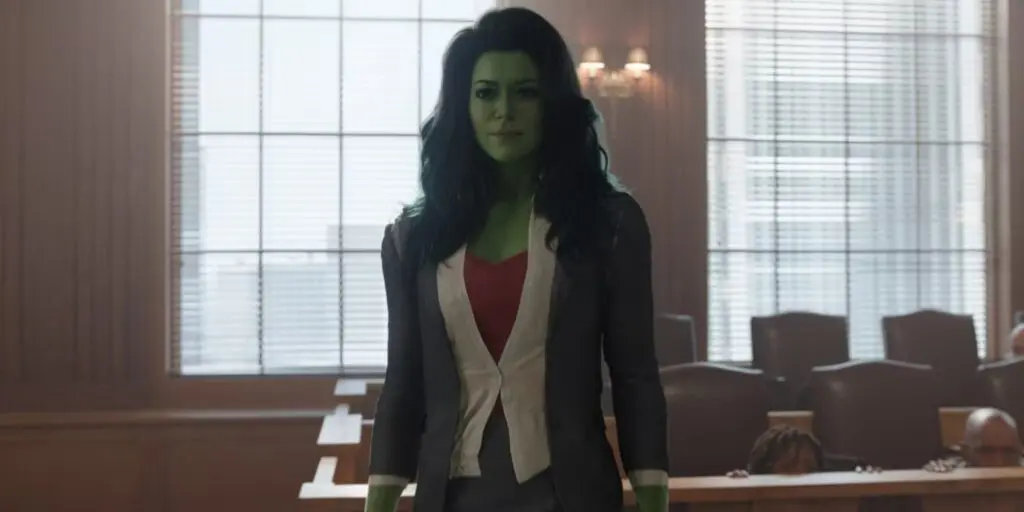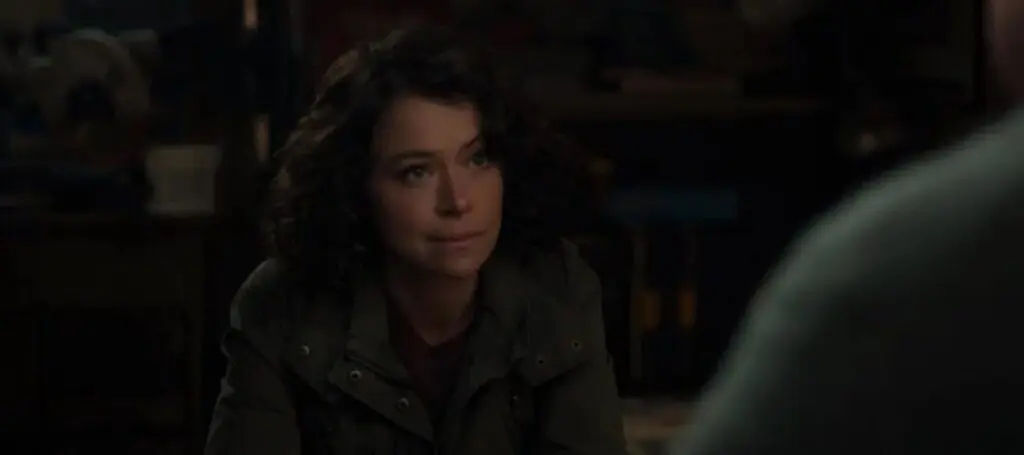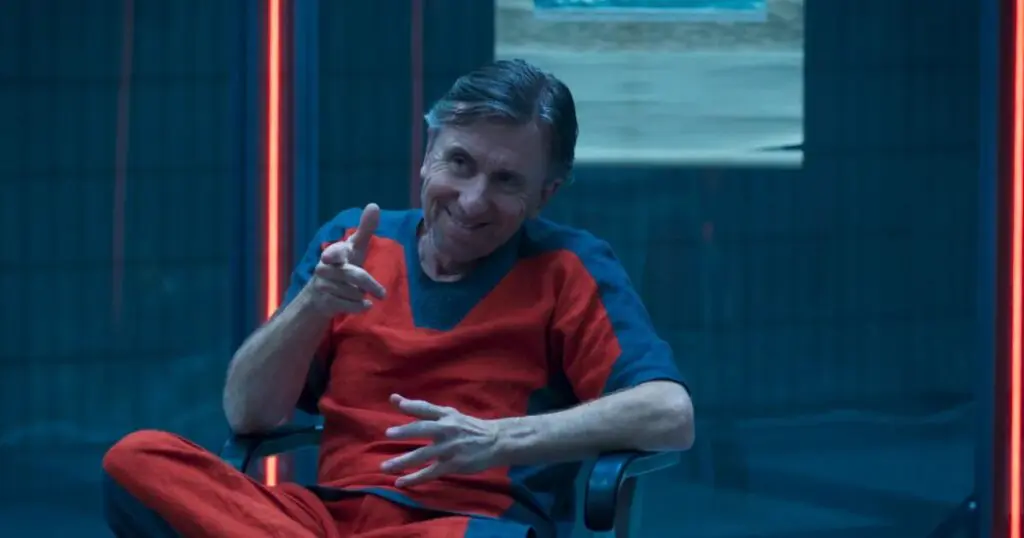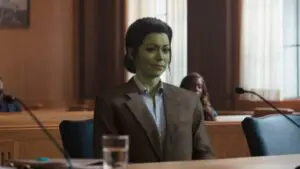Summary
“Superhuman Law” sees She-Hulk carve out a little more of its own identity, but it’s still a touch undermined by its inconsistent humor and overly obvious messaging.
After devoting most of the premiere to a rather truncated origin story, episode 2, “Superhuman Law,” begins to lay some necessary character and plot groundwork for She-Hulk. It’s concerned both with how Jessica is feeling as the new superhero of the moment and how that relates to her trying to navigate the legal field in a post–Age of Ultron MCU where superheroes have sudden accountability, world governments – though especially the U.S. government – have none, and being a superpowered vigilante is tantamount to being a celebrity – or a diversity hire.
She-Hulk is now a celebrity
If you’ve been around this universe since the halcyon days of 2008, it’s interesting to see how far things have come. Tony Stark ending his first movie with the iconic words, “I’m Iron Man,” is no longer a character’s arrogance subverting a genre’s fondness for secrecy and alter-egos.
These days, there have been so many potentially world-ending calamities that superheroes are an everyday part of life; trying to be one in secret is basically impossible. After she transforms to thwart Titania at the end of the previous episode, Jennifer makes the news. She’s met with chants of “She-Hulk” – a moniker she hates – everywhere she goes. She’s the latest in a long line of celebrity superheroes. As it’s awkwardly put during a family dinner scene, she isn’t even the first Hulk in the family.
There’s a whiff of X2 here. In that movie, Bobby “Ice Man” Drake revealed himself as a mutant to his family, and it was staged explicitly as a coming-out scene. The family dynamics in “Superhuman Law” seem a much more progressive and contemporary version of that.
It’s normalized to be a giant green anger monster now, but some people can’t help but be weird about it. Jessica’s father even makes an excuse to ask her how she’s really feeling in private. That theme of pretending to be someone you’re not or feeling a way that you don’t to placate others runs through the episode like the thick vein threading a Hulk-sized bicep.

She-Hulk: Attorney at Law season 1, episode 2 (Credit – Disney+)
Mixing Superhero with Law
For instance, Jen loses her job in the aftermath of the Titania incident and can only find commensurate employment under Holden Holliway (Steve Coulter), the GLK&H partner she went up against in the premiere. He claims to be impressed by Jen’s legal acumen, but he really wants to use her as the figurehead of a new, first-of-its-kind branch of superhuman law. She’ll have to work in She-Hulk form, and of course, everyone – including Jen – thinks she has only been offered the position because of her new abilities.
Like her awful co-worker, Dennis earlier accusing Jen of revealing her alter-ego just in time to drum up attention for herself, this forces Jen to confront the idea that, after a lifetime of proving herself in a male-dominated field, she now can’t help but be judged on everything other than her expertise.
Dennis is too arch of a character to really work – he needlessly refers to a woman as “it” in that scene, reducing him to simply a mouthpiece for cartoonishly right-wing sexism that even the stupidest dudes at least try and hide these days – but Holliway is more difficult to parse. He’s obviously using Jen, but he’s using her for her abilities and her credentials, not her femininity. It doesn’t make him a nice guy, but it at least prevents him from being a pointless cartoon. (I could insert a joke about the show’s CGI here, but I’m better than that.)
Emil Blonsky aka Abomination
The other advantage of Holliway is that he provides cases for Jen, and her first one is to secure parole for Emil Blonsky (Tim Roth), aka Abomination, who hasn’t been seen in the canon since Edward Norton’s The Incredible Hulk and that brief cameo in Shang-Chi and the Legend of the Ten Rings, which we’re reminded of right at the end of this episode as a kind of curveball that undermines Blonsky’s claims that his various soul mate prison pen pals and self-reflective apology haikus mean he’s totally reformed.
It’s great to see Tim Roth again since it’s a travesty they only used him for one movie in the first place, but it’s hard to tell where any of this is going. I can’t exactly see She-Hulk becoming a legitimate legal procedural.
But what’s interesting is that Blonsky is right, more or less. He was working on behalf of the U.S. government and was driven to superpowered insanity by being force-fed a dodgy version of Captain America’s super soldier serum by the very same guy who would later lecture the Avengers about accountability. He was used by the government and then hung out to dry, and the threat to national security he was dispatched to hunt became a beloved hero while he was left to languish in prison.

She-Hulk: Attorney at Law season 1, episode 2 (Credit – Disney+)
Jen talks briefly about this with Hulk to try and work through the moral conundrum of representing the guy who tried to kill him, but it turns out Bruce and Blonsky have largely patched things up thanks to that haiku, and after giving Jen his blessing – she had already made her decision anyway, but it’s nice to have him on-side – Bruce rockets off into space and presumably out of the show entirely.
So, She-Hulk is starting to come together as… something, though it’s unclear yet just what that something is going to be. It still has inconsistent humor, and its ability to make a point remains hampered by a tendency to make it with nuclear obviousness, but this episode’s acknowledgment of the wider MCU and the longstanding knock-on effects of its crowd-pleasing action means that She-Hulk probably won’t be as frivolous as first appearances suggested it might be.
RELATED: She-Hulk: Attorney at Law Season 1, Episode 3 Recap




